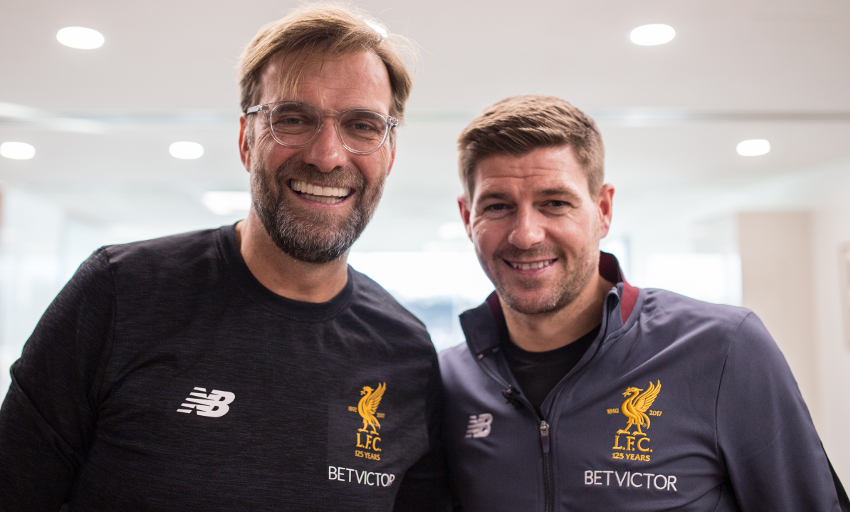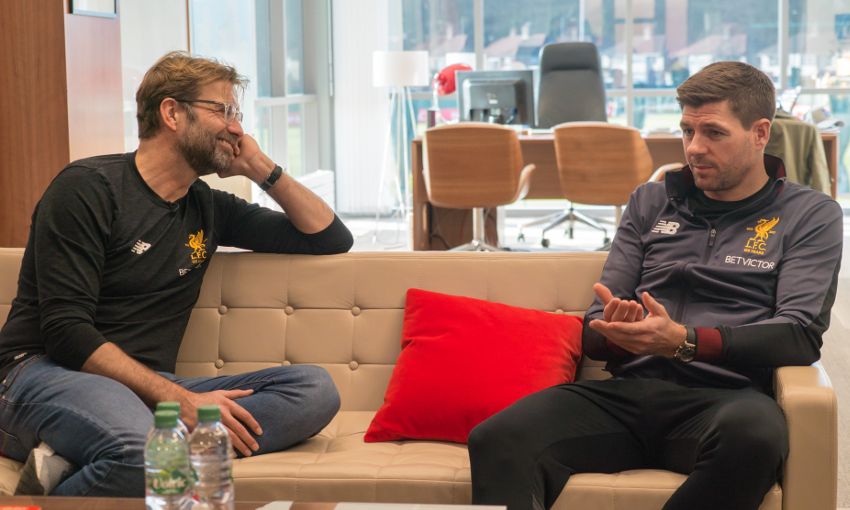Q&A: Read Gerrard and Klopp's fascinating management chat
Read the full transcript of an absorbing conversation which saw Steven Gerrard and Jürgen Klopp share their personal insight on the challenges of professional management.
The former is at the start of his coaching career with Liverpool U18s while the latter is two-and-a-half years into an Anfield project which followed successful spells at the helm of Mainz and Borussia Dortmund in Germany.
They recently met up inside Klopp’s Melwood office as part of a special behind-the-scenes tour of the training ground in association with BetVictor, an official principal partner of the club.
Up for discussion was the specific demands of being a boss, from dealing with players to managing expectations and creating the perfect environment for excellence.
Watch the free video or read on for the whole Q&A…
Do you remember the moment when you felt you wanted to be a manager?
Klopp: [Aged] 20! I was never happy with my football, to be honest. I knew I wanted to study sports. I played third-division football and trained, at 20, a youth team at Frankfurt and enjoyed it. I knew that was what I wanted to do. I was always waiting for the moment when somebody came to me and told me, ‘we all saw you cannot play football but maybe you want to train the team?’
Gerrard: For me, it was about trying it. We had numerous conversations and I asked Jürgen a lot of questions about what it was like. He spoke about his experiences. It was all about the next two years to go and sample it, try it and see what it is like. He gave me the pros and the cons, and gave me invaluable advice moving forward. I’m enjoying the role and making loads of mistakes, but they’re off-camera – which is what he suggested was the best move.
Now that I’ve experienced it, that was certainly the right move from the beginning. I’m just trying to grow and learn and get used to a completely different role – and completely different job – to being a player. That has been the most eye-opening thing for me, how different it is to being a player. Now I’ve got more respect for managers and coaches; I used to think I was the best coach and manager in the world when I was a player. ‘What are you doing that session for? Why are you doing this?’ Now, I apologise for all that and I realise how much of a difficult job it is for any coach or manager, because it’s a completely different ball game.
Klopp: It’s all about trial and error. Nobody knows how it works. If you ask Pep Guardiola, today it looks like he knows absolutely everything. [But] even he didn’t start perfect. He started at Barcelona B and was not perfect from the first day; he obviously thought, ‘maybe [Barcelona] is not the right job for me [now]’. You all have to do that. That’s why it’s so difficult to start on the public level where I am now, because people are talking constantly about you.
You need to get a resistance against that, you cannot always be in doubt about what you are doing. You cannot do what the people want, you need to do what you think is right. If you have a strong team around you it helps massively, because you have questions. You can’t imagine as a Premier League manager I could go out and say, ‘one question, what would you do in this situation?’ It’s not possible. Everyone would say, ‘you need to know’.
But we are human beings and so we still have questions – ‘how can I deal with this player or this problem?’ It’s good to have a strong team around, which I have. Not at the beginning [of my career], I started alone, but thankfully I got it. That’s the only help you can get. To learn all these things is a wonderful thing. Losing feels the same way on each level, but not having pressure from outside helps to make the right decision in the next game.
I’m really happy that Steven enjoys it because it doesn’t happen too often that a player of his size starts on this level. That’s why I always say it’s a job you have to learn. If you are ready to learn it you don’t have to be a genius to come through; you need to be busy and interested, and then it’s possible. And then it’s a big help that you have been a world-class player, because then you know all about the game and have your own ideas. But if it’s the only thing you were – a world-class player but not ready to learn the next step – then it doesn’t help.
Gerrard: That’s what I’ve learned in the six months – you don’t realise what comes with it. There is so much information to learn and take in.

Have you found anything in particular a struggle?
Gerrard: Everything that is new is not a struggle but is different. You go out of your comfort zone. For the first time, you have 25 players around you. You have to put what’s on the paper and go and deliver it on the field. Then you get your first player knocking on the door asking, ‘why aren’t I playing?’ Everything is new. Some things are a struggle because you’re not used to it or you’ve got no experience. But with time and experiences in certain situations, if you’re faced with the same thing again you think to yourself, ‘what did I do right? What did I do wrong?’ It is experiences that help you with decisions moving forward. But, I’m not going to lie, at the beginning you are like a rabbit in the headlights – ‘what am I going to do?’ – and it’s different. When you’re a player, you just turn up and think, ‘I know I can go and perform on the training pitch, or I can go and perform at Anfield’. But when you’re a manager, there is so much more that you have to think about.
Are you happy with picking up the phone and speaking to Jürgen if there is something you’re not sure about?
Gerrard: I have. That has already happened. There have been numerous times I have picked the phone up and texted, or been at Melwood and asked the question. He has already said in the media that the door is open for anything he can help me with. For me, that is gold-dust. He is obviously a lot more experienced than me in what I’m trying to do. Any little bits and bobs I can get from Jürgen and his staff, or anything I see him doing, I obviously need to take it in and add it to what I’m already doing.
Klopp: But it’s much better to learn it by yourself. For example, one big difference for me was the analysis. At the beginning I did it completely alone, because we had nobody to do it. Watching a game from the pitch – two days before I became a manager I had my last game – I saw it from right full-back. I had this view on the pitch and saw all of them from the back. Then you have the first game as a manager and sit there and see them all running. You are on the same level and think, ‘wow, that’s really a bad view’.
After the game, the first press conference – ‘what do you think about this situation and this situation?’ I struggled with the answers but I gave some. I first learned that they obviously don’t listen because otherwise they would have recognised I had no clue what I was talking about. I ran home actually and sat in front of the television watching the game back, again and again. I watched my first game as a manager four times the night after the game.
I wanted to be prepared for the next morning’s session, where I actually had to tell the players not my opinion but the truth about the game. An opinion is what you have after the game as a player. You think, ‘why did you play that ball?’ Players constantly talk about offensive situations until they concede a goal; they don’t talk about defensive situations until the ball is in. With me, I was a player two days before so I was their friend. I’m still their friend.
They came to me and asked me questions, and I needed to have answers. In the beginning, I always sent them out and said, ‘give me five minutes’. I needed to think about it, I didn’t have an answer. But we could do it because I was not in public – it was the Championship in Germany. There was no public involved in that moment. That was good. Learn it by yourself because you cannot do it the way somebody else is doing it. You can pick up things; you can say, ‘I like Jürgen Klopp football, this part of football, how United get results, very good’. Being more serious in a game and now fluent in a game is all OK.
You will see it and then you have to think about how you can achieve it and get it for your boys, not going out and asking, ‘what do you do in training so it looks like that?’ That is different. We all have our different ways. It’s a fantastic time at the moment, and hopefully Steven feels it, that he can really do what I miss very often: just train. Because the job now has so many things around that sometimes there is no time for training and you think, ‘wow, how did that happen?’
Gerrard: The other thing as well is that it’s about personnel. I might say to my kids, ‘we have to play the Jürgen Klopp way’ but I haven’t got Jürgen Klopp’s players. I’ve got different players with different styles. You have to find out about the individual, their strengths and weaknesses and then play a way that suits those people. I don’t think it’s fair to ask some of my kids to run like Mane or do what Firmino does, because they’re already ready to be top players. But it’s a fascinating job because you learn so much every day about players.



